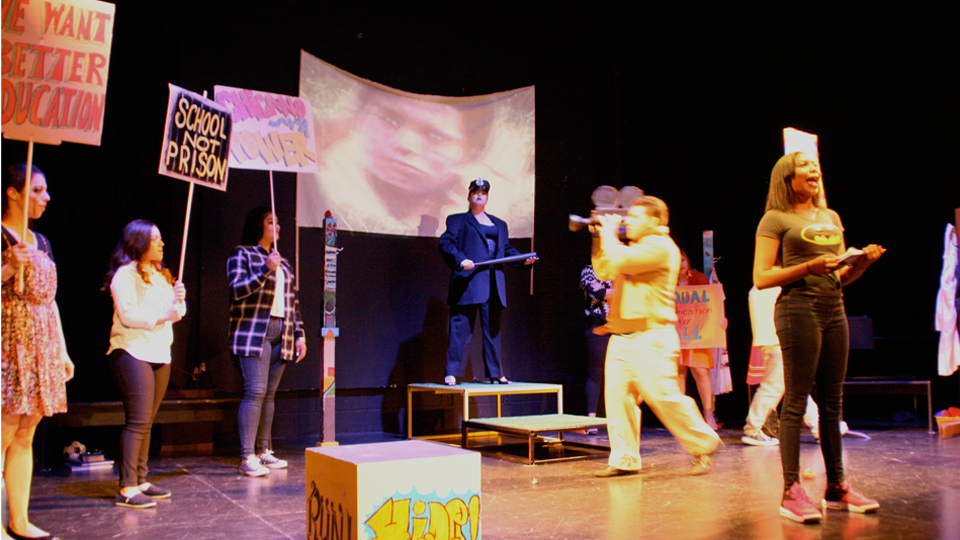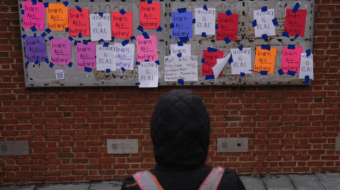
LOS ANGELES—The Plaza de la Raza’s Margo Albert Theatre hosted two performances of I: Witness on April 7 and 8, an hour-long student-written play of courage and hope inspired by the lives of significant Chicano elders told through the voices of today’s youth.
Produced as part of the Chicano Legacy Project, which aims to enrich the public’s knowledge of the rich history of the 1960s and ’70s Chicano movement and provide youth with a transformative educational experience, I: Witness is based on interviews with four Chicano elders: poet Gloria Enedina Alvarez; muralist and visual artist Yreina Cervantez; poet Marisela Norte; and filmmaker and producer Jesús Treviño. In the play, these main characters are guided by The Jaguar, a spirit animal in the magical realist mold, as they search for purpose and gain the courage to stand up and affect change.
Performed and designed by students from Pueblo de Los Angeles High School alongside professionals, and brought to the stage by About Production, I: Witness parallels the lives of veterans from the East Los Angeles Student Walkouts, Chicano Moratorium and seminal art movements with those of the youth of current-day East L.A. Students from Pueblo High School in the Young Theaterworks Program and from Monterey High School wrote the script.
After each performance of I: Witness a discussion with the cast, audience and some of the featured personalities in the play took place. At the performance I attended Jesús Treviño and Yreina Cervantez were present—Treviño, not surprisingly, manning the video equipment and filming the show.
Once again the subversive head of the National Endowment for the Arts rises up to face Trump’s firing line. It was one among the funding sources for the programs that contributed to the mounting of this production, along with the California Arts Council, the City of L.A. Department of Cultural Affairs, the Eastside Arts Initiative, and the L.A. County Arts Commission. Chicano Legacy Project events are also co-sponsored by the UCLA Chicano Studies Research Center. A people with no knowledge of its history can be led blind into an unknown and unknowable future.
A few simple props are all the actors needed—some benches, a few boxes to stand on, clothes racks for quick costume changes, and a blank demonstration banner onto which images and history, and perhaps our own memories of the period, were projected.
The Jaguar (Estela Garcia) was an effective artistic choice. She was dressed in 1940s Zoot Suit style like El Pachuco in the recently revived Zoot Suit play by Luis Valdez. It was refreshing to see a female incarnation of this classic persona, especially as three of the featured “elders” in the play were women. “In the space between dreaming and writing,” she counsels a young aspiring poet, “you can make anything happen.”
The two most realized characters in the play are the budding filmmaker Treviño (Adrian Brizuela), who doubles as a rap-talking tree and Marisela Norte’s boyfriend, and the artist Yreina Cervantez (Cynthia Callejas), whose mother’s home embroidery inspired her. As a graduate art student she had to convince her professors that murals were a legitimate artistic form—they had clearly forgotten about Diego Rivera, David Alfaro Siqueiros and others in the 20th-century mural movement. It became clear that the Chicano community was sending its young people to college not only to receive an education but also to educate the institutions.
Norte is played warmly and sympathetically by Marlene Beltran Cuauhtin, and Gloria Enedina Alvarez by Kimberly Barrita.
The actors created a palpable sense of urgency reflecting the tumultuous 1960s. The student walkout at Lincoln High School was prompted by the firing of a popular Chicano teacher, Sal Castro, who was reinstated. At Wilson High School, students complained about no bathroom breaks and being punished for speaking Spanish. Books, courses and teachers in East L.A. were not the same as in whiter, more prosperous districts. The 1969 Chicano Moratorium, which focused on the Vietnam War, turned violent at the hands of the police: It was when the pioneering Los Angeles Times reporter Ruben Salazar was murdered by the LAPD under circumstances still never brought to light. “Ya basta!” became the movement slogan. “Enough already!”
”I look forward to witnessing the students’ transformation both on stage and off,” said Juan Parada, an immigrant from El Salvador who was the production director and lead teaching artist. “This play has many parallels to their lives, and the students at Pueblo High School are as resilient as the characters in our play. I am inspired by their willingness to take risks and step out onto that stage and do something that, perhaps no one, not even themselves, imagined they would do.”
Producing artistic director of About Productions,Theresa Chavez, spoke of the effect on both students and audiences of recalling this history: “a deeper understanding of what is possible when a community is inspired to speak for itself for both the collective good and individual empowerment.” Since 2001, About Productions’ Young Theaterworks Program has worked to empower highest-risk youth in L.A. County with intensive residencies that help students improve literacy, communication and collaboration skills. Harnessing these abilities, students in the program receive higher grades in school, graduate high school at higher rates and become stewards of their community’s history.
In the Q&A after the performance, Treviño cited the incremental gains that have vastly improved life for Chicanos in the U.S. And yet, he said, “in our own community we have a job to do. Our parents were not always there for us—not out of malignance but out of ignorance.” A teacher in the audience referred to many of the same problems in schools today that we saw in the 1960s. The struggle continues.
To see a preview of the play, visit this site.










